|
|
|
Sort Order |
|
|
|
Items / Page
|
|
|
|
|
|
|
| Srl | Item |
| 1 |
ID:
122596
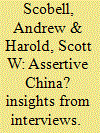

|
|
|
|
|
| Publication |
2013.
|
| Summary/Abstract |
Recent years have witnessed the emergence of a more assertive China. What happened to China's "peaceful rise" and "charm offensive"? What explains the changes in China's foreign policy? According to interviews with Beijing and Shanghai-based analysts, China's assertiveness between 2008 and 2010 can be divided into two waves, each triggered by a different cause. The first wave seems triggered by a sense in Beijing that Washington, DC was more differential to China's interests, and less committed to East Asia. The second wave seems best explained as China's response to what it perceived as a far more assertive and threatening United States. Both waves were amplified by two domestic challenges: Chinese leaders' hypersensitivity to popular nationalism and poor bureaucratic coordination among an expanding number of foreign policy actors.
|
|
|
|
|
|
|
|
|
|
|
|
|
|
|
|
| 2 |
ID:
078218
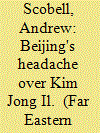

|
|
|
| 3 |
ID:
135967


|
|
|
|
|
| Summary/Abstract |
RAISE THE SUBJECT OF TAIWAN WITH ANYONE from the People's Republic of China (PRC)—whether the person is a government official or an ordinary citizen—and you will probably get a vehement and passionate articulation of China's sovereign claim to the island. But Taiwan is not just an emotional hot-button issue in China; rather, it is considered the PRC's most sensitive security issue.
Indeed, Beijing views Taipei as a major rival, or at least as posing a serious security threat. Certainly there are other political entities that China sees as rivals—the United States and Japan come swiftly to mind. It is easy to understand at a glance why Beijing would perceive Washington and Tokyo as rivals—in terms of the magnitude of the economic and military clout of each, as well as the geographic and demographic size of the United States and Japan. In contrast, to the casual observer, Taiwan would not seem likely to be perceived by China as a rival. The balance of power across the Taiwan Strait is extremely lopsided in favor of China. While the island is an economic dynamo and global trading power of considerable significance and possesses a credible defense capability, all these are dwarfed by the gargantuan capabilities of its cross-strait neighbor. Given this glaring asymmetry in the balance of power between China and Taiwan, why would Beijing characterize its relationship with Taipei as a rivalry?
|
|
|
|
|
|
|
|
|
|
|
|
|
|
|
|
| 4 |
ID:
154329
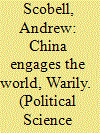

|
|
|
| 5 |
ID:
146372
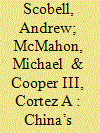

|
|
|
|
|
| Summary/Abstract |
One of the most eye-catching episodes in China’s defense buildup was the 25 September 2012 commissioning of Beijing’s first aircraft carrier. The sixtyfive-thousand-ton Liaoning was launched with much fanfare, presided over by the president of the People’s Republic of China (PRC), then Hu Jintao, as well as by the vice president and Hu’s political successor, Xi Jinping. The commissioning of Liaoning underscored both the remarkable advances in the PRC’s shipbuilding in recent decades and the significant limitations that remain. The vessel immediately became the largest in the People’s Liberation Army Navy (PLAN).
|
|
|
|
|
|
|
|
|
|
|
|
|
|
|
|
| 6 |
ID:
189444
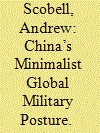

|
|
|
|
|
| Summary/Abstract |
What explains the mismatch between China’s vast economic presence, significant diplomatic engagement around the world, and its miniscule global military posture? China’s global defense footprint – as measured by overseas deployments and basing – is extremely modest compared to that of many other great powers. While military activity and the construction of military installations in the Asia-Pacific have both expanded noticeably in recent decades, China appears far more reticent to project or station armed forces beyond its immediate neighborhood. Domestic normative factors can explain Chinese hesitancy to increase its global military posture while geostrategic factors can explain the elevated regional activity and clustering of new bases around China’s periphery.
|
|
|
|
|
|
|
|
|
|
|
|
|
|
|
|
| 7 |
ID:
132426
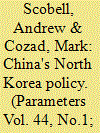

|
|
|
|
|
| Publication |
2014.
|
| Summary/Abstract |
There has been much speculation lately about a Chinese
"rethink" on North Korea. Beijing has clearly been exasperated with Pyongyang. What is going on with Beijing's Pyongyang policy? Has there actually been a reassessment of the PRC's policy toward the DPRK? Is there a military component to this policy, and what do we know about planning by China's People's Liberation Army for a Korea contingency? This article answers those questions.
|
|
|
|
|
|
|
|
|
|
|
|
|
|
|
|
| 8 |
ID:
116620
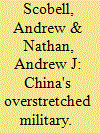

|
|
|
|
|
| Publication |
2012.
|
| Summary/Abstract |
Despite the dramatic growth of China's military power since the early 1990s, the Chinese People's Liberation Army (PLA), as all branches of China's armed forces are collectively known, remains overstretched as it seeks to address the wide range of missions it is called upon to perform. "China threat" theorists worry that the PLA poses a more significant challenge to the United States and China's neighbors than it did twenty years ago, and they are right. Yet the Chinese military is far from able to successfully carry out all its most pressing military tasks within China's borders and in its immediate neighborhood, and has only begun to project significant force beyond the Asia-Pacific.1 The real test for the PLA will be how adept it proves to be at bringing together new weapon systems, equipment, and formations in response to one or more serious instances of wartime or peacetime contingencies-a broad set of requirements the Chinese have dubbed "Diversified Military Tasks."2
|
|
|
|
|
|
|
|
|
|
|
|
|
|
|
|
| 9 |
ID:
132868
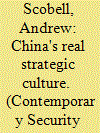

|
|
|
|
|
| Publication |
2014.
|
| Summary/Abstract |
The Great Wall is frequently held up as the most striking symbol of the potency of a persistent Chinese pacifist, non-expansionist, defence-minded strategic stance. But how accurate is this 'Great Wall' depiction of China's strategic culture? What is the impact of this depiction on China and the Asia-Pacific region? While the Great Wall is an apt symbol of a romanticized image of Chinese strategic culture, the reality behind the genesis of this impressive fortification and the accompanying pervasive belief in a monistic strategic tradition is that they are figments of the collective contemporary Chinese imagination. Nevertheless, these formidable myths exert real influence on two 'faces' of strategic culture. The first face refers to how leaders and society perceive the policies and actions of their own country. The second face, routinely neglected, refers to how leaders and society in one state perceive the policies and actions of an adversary or potential adversary state, which, like the first face, is constructed out of myth. The impact of these two faces on the Asia-Pacific region exacerbates the region's security dilemma, adversely impacting China's relations with other countries, notably Japan and the United States.
|
|
|
|
|
|
|
|
|
|
|
|
|
|
|
|
| 10 |
ID:
120271


|
|
|
|
|
| Publication |
New York, Columbia University Press, 2012.
|
| Description |
xxiii,406p.hbk
|
| Standard Number |
9780231140508
|
|
|
|
|
|
|
|
|
|
|
|
Copies: C:1/I:0,R:0,Q:0
Circulation
| Accession# | Call# | Current Location | Status | Policy | Location |
| 057295 | 355.033551/NAT 057295 | Main | On Shelf | General | |
|
|
|
|
| 11 |
ID:
159136
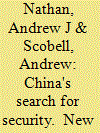

|
|
|
|
|
| Publication |
New York, Columbia University Press, 2012.
|
| Description |
xxiii, 406hbk
|
| Standard Number |
9780231140508
|
|
|
|
|
|
|
|
|
|
|
|
Copies: C:1/I:0,R:0,Q:0
Circulation
| Accession# | Call# | Current Location | Status | Policy | Location |
| 059387 | 355.033551/NAT 059387 | Main | On Shelf | General | |
|
|
|
|
| 12 |
ID:
050007
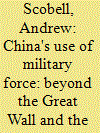

|
|
|
|
|
| Publication |
Cambridge, Cambridge University Press, 2003.
|
| Description |
xiv, 299p.
|
| Series |
Cambridge modern China series
|
| Standard Number |
0521525853
|
|
|
|
|
|
|
|
|
|
|
|
Copies: C:1/I:0,R:0,Q:0
Circulation
| Accession# | Call# | Current Location | Status | Policy | Location |
| 047415 | 355.033051/SCO 047415 | Main | On Shelf | General | |
|
|
|
|
| 13 |
ID:
178705
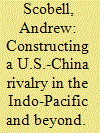

|
|
|
|
|
| Summary/Abstract |
The Washington-Beijing rivalry of the early twentieth century was neither pre-ordained nor an aberration. It was constructed as domestic constituencies in each country were socialized toward confrontation. Pro-cooperation coalitions, which had emerged in each country to support alignment against a mutually perceived Soviet threat, were undermined by the final chapter of the Cold War. Yet a simmering U.S.-China rivalry was subsumed by an unsustainable accommodation of mutual self-interest by Washington and Beijing during the first two decades of the post-Cold War era. By the 2010s, the rivalry had become quite visible as pro-cooperation coalitions in the United States and China had splintered and been supplanted by pro-confrontation coalitions. U.S. and Chinese geostrategic reassessments also contributed to the emerging rivalry.
|
|
|
|
|
|
|
|
|
|
|
|
|
|
|
|
| 14 |
ID:
081306
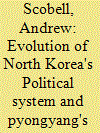

|
|
|
|
|
| Publication |
2008.
|
| Summary/Abstract |
Since the formal establishment of the Democratic People's Republic of Korea (DPRK) in 1948, the Korean Peninsula has witnessed regular crises, repeated tensions, and occasional attempts at negotiation and conflict management. Most scholars and analysts seek to explain this record with reference to balance-of-power dynamics between the two Koreas, with particular attention to the evolving alliance and adversarial relationships of Pyongyang and Seoul, to explain the past five decades of Korean history. Perhaps equally important in comprehending the Korean conundrum is to understand the internal dynamics in the countries concerned over the past half century. This paper examines the historical evolution of the DPRK's political system to analyze what, if any, impact domestic political realities have had on that country's potential to pursue conflict management on the Korean Peninsula.
|
|
|
|
|
|
|
|
|
|
|
|
|
|
|
|
| 15 |
ID:
064987


|
|
|
| 16 |
ID:
148138
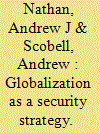

|
|
|
|
|
| Summary/Abstract |
ANDREW J. NATHAN and ANDREW SCOBELL analyze the gains and losses to Chinese security from the country’s embrace of globalization in the post-Mao period. They argue that while China has grown richer and more influential, it has also been penetrated by global forces that it does not control and become enmeshed in complex relationships of interdependence.
|
|
|
|
|
|
|
|
|
|
|
|
|
|
|
|
| 17 |
ID:
162695
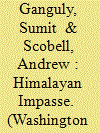

|
|
|
|
|
| Summary/Abstract |
In mid-June 2017, Bhutanese authorities detected Chinese personnel, presumably members of the People’s Liberation Army (PLA), building a road in a disputed region of the Doklam plateau near the Bhutan-China-India tri-junction. Lacking the military wherewithal to prevent the activity underway, Bhutan turned to India for assistance.1
1 Vidhi Doshi and Simon Denyer, “China Pushes Hard in Border Dispute with India,” Washington Post, July 6, 2017, https://www.washingtonpost.com/world/asia_pacific/china-pushes-hard-in-border-dispute-with-india/2017/07/06/52adc41e-619b-11e7-80a2-8c226031ac3f_story.html?noredirect=on&utm_term=.0e4267c15214.
View all notes
Within days, Indian Army units were deployed to the area to halt the road construction. Over the next month or so, Indian and Chinese military units became involved in a close confrontation with neither side displaying any interest in standing down. Eventually, the Chinese stopped their activity toward the end of August but did not abandon their claims to the disputed areas.
|
|
|
|
|
|
|
|
|
|
|
|
|
|
|
|
| 18 |
ID:
114118
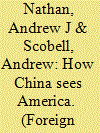

|
|
|
|
|
| Publication |
2012.
|
| Summary/Abstract |
United States worries about China's rise, but Washington rarely considers how the world looks through Beijing's eyes. Even when U.S. officials speak sweetly and softly, their Chinese counterparts hear sugarcoated threats and focus on the big stick in the background. America should not shrink from setting out its expectations of Asia's rising superpower -- but it should do so calmly, coolly, and professionally.
|
|
|
|
|
|
|
|
|
|
|
|
|
|
|
|
| 19 |
ID:
064628
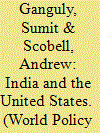

|
|
|
| 20 |
ID:
090488


|
|
|
|
|
|
|
|